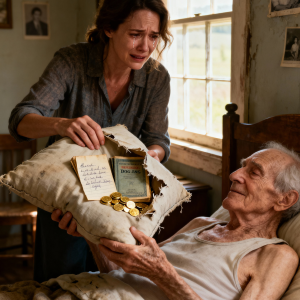
The golden afternoon sun spilled through the Venetian blinds of our modest flat in Savannah, Georgia, casting stripes across the living room where I had always imagined a quiet, shared life with my husband, Lucas. Life had been steady enough. My job as a marketing coordinator earned me around $3,800 a month, enough to cover bills and occasional treats, while Lucas’s freelance carpentry work fluctuated with the seasons. We weren’t wealthy, but we were content.
That contentment evaporated the moment his mother, Mrs. Hawthorne, discovered how much I earned.
At first, she smiled with the warmth of someone proud of a new family member, patting my shoulder and praising my diligence. But the next morning, her eyes had hardened, gleaming with a sharp opportunism I hadn’t seen before. Without consulting me, she summoned Lucas’s three younger brothers—Simon, Victor, and Henry—who lived in rural Alabama.
“They’ll need a place to stay,” she said, as if declaring law. “And since Eleanor earns so well, she can provide. It is only fair.”
I froze as I watched them arrive, each dragging battered suitcases into our once-cozy flat. Mrs. Hawthorne’s voice echoed like a proclamation: “Eleanor, you will take care of them. They are family, and now it is your responsibility.”
My home, once a sanctuary, had transformed overnight. Pots clattered as I scrambled to feed three more mouths, laundry piled into towering stacks, and the air was heavy with smoke and unwashed clothes. The brothers lounged on the couch, demanding meals and complaining when they were slightly late, offering no help, while I moved between work and housework in a daze.
Lucas seemed torn, but his soft-spoken protests carried little weight against his mother’s will. “Just give it time, Eleanor. They are family,” he whispered, his voice almost apologetic.
But patience has its limits. On the third evening, when Victor snapped at me for not serving dinner quickly enough, something inside me broke. I looked around—three men sprawled on the couch, my mother-in-law watching with cold satisfaction, and Lucas silent in his chair.
That night, I quietly packed a suitcase. It was not just clothes I packed, but every fragment of dignity I had left. Leaving a note on the counter, I wrote, “I married you, Lucas, not your entire extended family. If you cannot protect our home, I will protect myself.”
Before dawn, I boarded a bus back to my hometown in Cedarville, Ohio, unsure of what awaited me but certain that staying would destroy me.
Returning to Cedarville felt like stepping into a simpler, more forgiving world. My parents’ small, white-bricked house sat at the edge of town, surrounded by rolling meadows. My mother hugged me without questions, her eyes understanding more than words could convey.
For the first time in weeks, I could breathe. I sipped my coffee on the porch in silence, worked my remote hours without interruption, and slowly, carefully, rebuilt my life. I reconnected with old friends, some of whom ran small businesses, and began offering financial guidance as a side project. For the first time in months, I felt I was thriving rather than merely surviving.
A week later, Lucas arrived, looking weary and aged. “Eleanor, I need you to come back,” he said, his voice low but urgent. “Everything is falling apart without you. The brothers are destroying the apartment, pawning tools, leaving trash everywhere. My mother didn’t anticipate this, but she still refuses to help.”
I wanted to believe him, but trust is not rebuilt overnight. “I need proof, Lucas. Words aren’t enough,” I replied, my voice steady despite the turmoil inside.
Back in Savannah, his absence had shaken the household. Mrs. Hawthorne tried to maintain control, but without me to enforce her unspoken rules, chaos erupted. The brothers fought constantly, blaming one another for meals and chores, while neighbors complained about noise and overflowing trash.

Finally, Lucas confronted them. “This is my marriage. Eleanor is my wife, not your servant. You leave, now,” he said, voice trembling but firm. Then, he faced his mother, “You cannot run my home. I have to protect what is mine.”
The following week, he called. “They’re gone. I told them they’re not welcome. I won’t let anyone take us apart,” he said.
When I returned, the apartment had changed. It was quiet, organized, and filled with Lucas’s effort alone. He burned the edges of dinner, fumbling slightly, but the sincerity in his eyes melted my remaining doubts.
We sat at the table, hand in hand, feeling like partners once more. The ordeal had forced everyone to face realities they had ignored. Lucas had finally learned that love alone is insufficient; boundaries and respect must accompany it.
I had left with little more than a suitcase, but I returned with something far more valuable: respect, independence, and a renewed voice in my own life. As Lucas squeezed my hand that night, I realized that one quiet act of self-preservation had reshaped everything.




